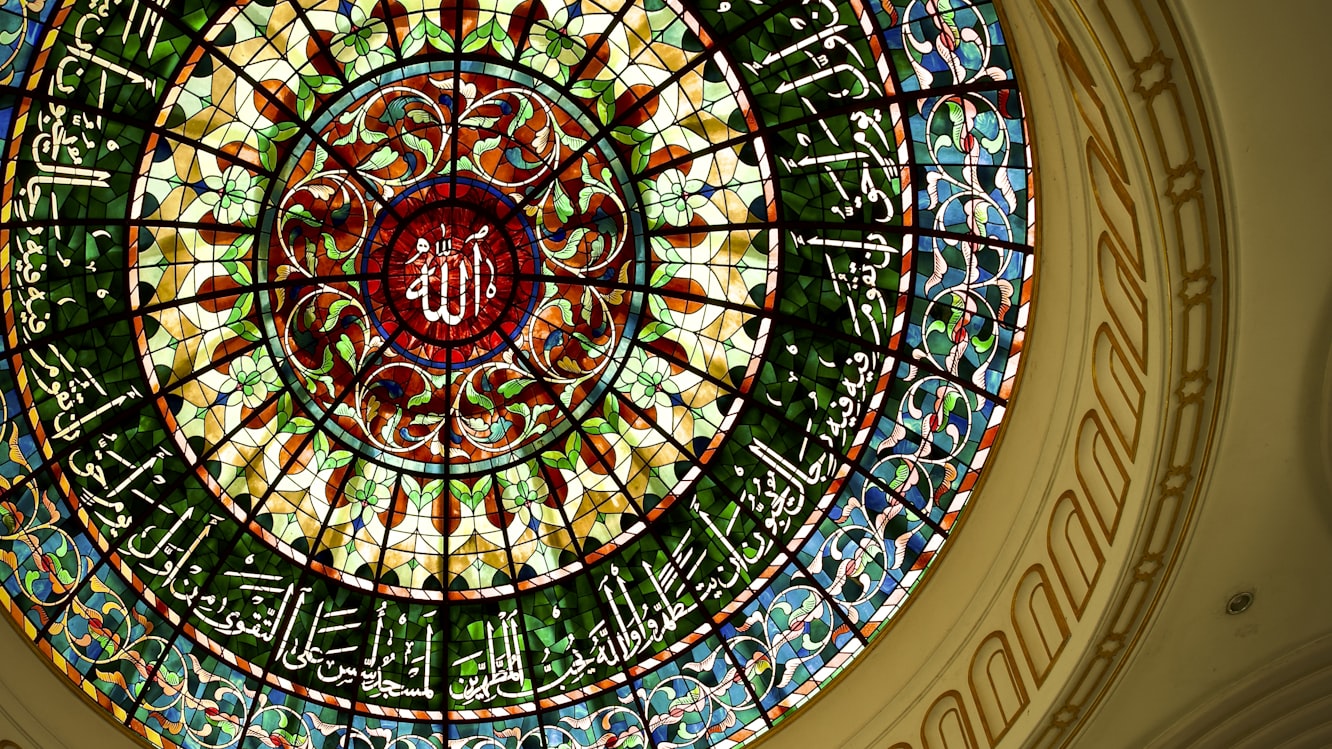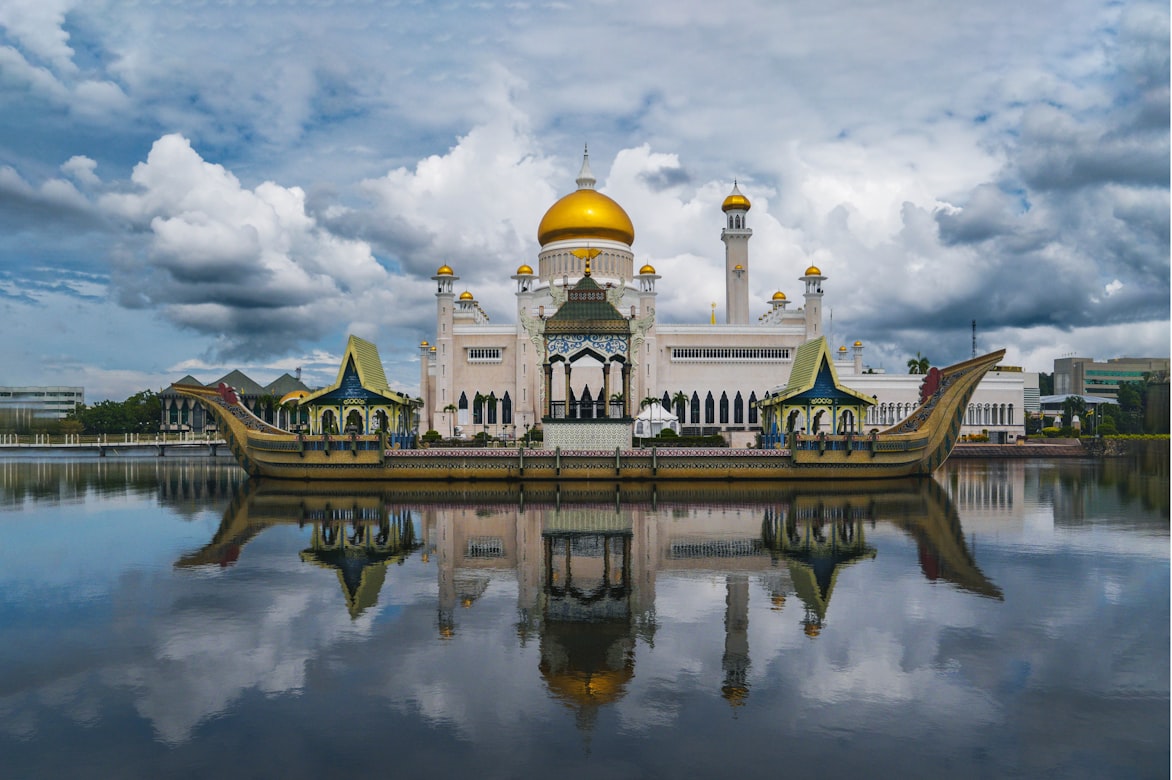Top Attractions
Brunei, nestled on the northern coast of Borneo, may be small in size, but it offers an intriguing blend of opulent Islamic architecture, untouched rainforests, and quiet, authentic culture. One of the most iconic landmarks in the country is the Sultan Omar Ali Saifuddien Mosque in Bandar Seri Begawan. With its gleaming golden dome, marble minarets, and surrounding lagoon, this mosque is both a religious site and a symbol of national pride. Just across the capital, visitors can explore the Jame’ Asr Hassanil Bolkiah Mosque, which is equally stunning in scale and ornamentation, with its twenty-nine golden domes and lush gardens.
For nature lovers, Ulu Temburong National Park is a pristine paradise. Accessible only by boat and road through a series of winding rivers and jungle paths, the park is part of Brunei's conservation success story. Visitors can walk high above the forest canopy on suspended walkways, spot rare birds and butterflies, and immerse themselves in the unspoiled biodiversity of the Bornean jungle.
Another unique cultural site is Kampong Ayer, the world’s largest water village. Located along the Brunei River, this centuries-old settlement is home to thousands of residents who live in wooden houses on stilts, connected by a maze of boardwalks. Taking a water taxi through the village gives travelers insight into traditional ways of life that remain very much alive.
The Royal Regalia Museum offers a glimpse into the monarchy, showcasing lavish gifts and artifacts associated with the Sultan. For those who enjoy tranquil outdoor experiences, the Tasek Lama Recreational Park, right in the heart of the capital, provides hiking trails, waterfalls, and forested scenery just steps from the city.
Local Dishes
Brunei’s cuisine is deeply influenced by Malay, Chinese, and Indian culinary traditions, resulting in a flavorful and diverse food culture. One staple dish that locals and visitors alike enjoy is nasi katok, a simple but beloved meal consisting of steamed white rice served with a piece of spicy fried chicken and a generous scoop of sambal chili paste. Despite its simplicity, the dish is flavorful and widely available at roadside stalls and small eateries.
Ambuyat, Brunei’s most iconic traditional dish, is made from the sago palm's starchy core. This sticky, glue-like substance is eaten using a two-pronged stick called a chandas, and it's dipped into various sour or spicy sauces, providing a unique textural experience. While ambuyat may be an acquired taste, it offers a deep dive into Brunei's culinary heritage.
Mee goreng and nasi goreng are also prevalent, typically stir-fried with a mix of soy sauce, egg, chicken, and vegetables. These comforting noodle and rice dishes reflect regional influences and are affordable and filling.
Sweet dishes like kuih melayu—colorful steamed rice cakes—are found in local markets and offer a delightful end to meals. Another popular dessert is pulut panggang, glutinous rice filled with spicy shrimp or coconut, wrapped in banana leaves and grilled over charcoal for a smoky finish.
Beverages such as teh tarik (pulled milk tea) and kopi O (strong black coffee) are commonly enjoyed throughout the day. Despite being a Muslim-majority country with restrictions on alcohol, many restaurants serve refreshing fruit juices and mocktails that pair well with Brunei’s rich, spicy dishes.
Transportation Tips
Getting around Brunei is relatively straightforward, although limited public transport infrastructure means travelers may need to plan ahead. The capital city, Bandar Seri Begawan, offers a limited but inexpensive public bus network that covers key urban and suburban areas. However, buses are infrequent and routes are not always clearly marked, making them less reliable for tight schedules.
Taxis exist but are few and far between, and they are not metered, so fares must be agreed upon in advance. Ride-sharing apps like Dart have become increasingly popular and are the most convenient option for navigating the city.
For travelers wanting to explore beyond the capital or visit natural sites like Ulu Temburong National Park, hiring a private driver or booking a tour is the most efficient option. Roads in Brunei are well-maintained, making self-driving a viable option, especially for those who want flexibility in their itinerary. Rental cars are widely available and relatively affordable, but travelers should be aware of local driving customs and laws, including left-side driving and strict penalties for traffic violations.
Water taxis are essential for visiting Kampong Ayer, and they also provide scenic transport across the Brunei River. These are easy to catch from the waterfront and offer a unique way to see daily life in the water village.
Bandar Seri Begawan’s small size means walking is also a pleasant way to explore downtown attractions, especially with the city's cleanliness and general safety. However, the heat and humidity can be intense, so it's wise to carry water and sun protection.
Budget Travel Tips
Traveling on a budget in Brunei is certainly doable. Opt for local food stalls and hawker centers where meals are both affordable and authentic. Accommodations like guesthouses and budget hotels provide comfortable options at lower prices. Visiting mosques, museums, and nature reserves is often free or costs very little. Skip taxis when possible and instead rely on walking in urban areas or arranging shared rides to cut costs. Traveling with a group can also reduce expenses for tours and transportation.
Safety Info
Brunei is one of the safest countries in Southeast Asia, with low crime rates and a strong sense of public order. Violent crime is extremely rare, and petty theft is uncommon, though standard precautions are always advised. The country enforces strict laws, including bans on alcohol sales and strict drug penalties, so travelers should be aware and respectful of local regulations. Women travelers generally feel safe and are treated with respect, especially when dressed modestly in public.
Cultural Etiquette
Brunei is a conservative Islamic country where modesty, politeness, and respect are key elements of social interaction. Visitors should dress modestly, especially when entering mosques or rural areas—covering shoulders, arms, and legs is expected, and women may be required to wear a headscarf inside religious buildings. Footwear should be removed before entering homes and places of worship.
Public displays of affection are discouraged, and behavior in public should remain reserved and respectful. It is customary to greet others with a gentle handshake, although many Bruneians prefer not to shake hands with the opposite sex unless the other person initiates it. When handing someone something, particularly money or a gift, it is polite to use the right hand or both hands, as the left is traditionally considered unclean.
During the Islamic holy month of Ramadan, travelers should avoid eating, drinking, or smoking in public during daylight hours out of respect for those who are fasting. Alcohol is not sold publicly in Brunei, and while non-Muslims are permitted to bring in a small quantity for personal use, it must be declared at the border.
Taking photos of people, especially women, should only be done with permission. It’s also considered rude to point directly at someone or touch their head. Generally, a calm, courteous demeanor will be warmly received, and tourists who show an interest in local customs are appreciated by Bruneians.
Travel Style Fit
Brunei is best suited for travelers who appreciate tranquility, cultural depth, and natural beauty over bustling nightlife or high-adrenaline adventures. It appeals to those who enjoy structured itineraries, appreciate religious and royal history, and value safety and cleanliness in their travel experience. Nature lovers will be drawn to its untouched forests, while culturally curious travelers will enjoy its unique blend of Malay traditions and Islamic heritage.

Best Time to Visit
The best time to visit Brunei is during the dry season, which typically spans from January to May. These months offer the most pleasant weather for exploring rainforests, mosques, and cultural sites without frequent downpours. However, Brunei’s equatorial climate means it remains warm and humid year-round, with occasional rain even in drier months. If you're interested in local festivals, the Sultan’s birthday in July brings vibrant celebrations, parades, and cultural performances.
Accommodation Recommendations
For budget travelers, the Apek Utama Hotel offers basic but clean accommodations in Bandar Seri Begawan, with proximity to local eateries and attractions. Another affordable option is EZ Lodge, a no-frills guesthouse with friendly hosts and good Wi-Fi.
Mid-range travelers may enjoy staying at The Capital Residence Suites, which provides a free airport shuttle, complimentary breakfast, and a central location ideal for exploring the city. Radisson Hotel Brunei Darussalam also offers good value with upgraded amenities and spacious rooms.
Luxury seekers should consider The Empire Brunei, a spectacular 5-star beachfront resort boasting opulent architecture, a private golf course, and world-class dining. With marble finishes, sprawling grounds, and unparalleled service, it is a destination unto itself.
Languages Spoken
Malay (Bahasa Melayu) is the official language, but English is widely spoken, especially in business, education, and tourism settings. Mandarin Chinese and various Chinese dialects are also common among the Chinese community. Visitors who speak only English will generally have no trouble communicating in Brunei.
Currency
The official currency is the Brunei Dollar (BND), which is pegged at par with the Singapore Dollar. Both currencies are accepted interchangeably within Brunei, though Singapore may not always accept BND. Credit cards are widely accepted in urban areas, but having some cash on hand is useful for small vendors, taxis, and rural markets.
Common Traveler Mistakes to Avoid
One common mistake is underestimating the conservative nature of Brunei's culture—dressing too casually or acting inappropriately in public can be seen as disrespectful. Some travelers also forget that alcohol is not readily available and try to bring in more than the permitted amount, which can result in confiscation or fines. Additionally, skipping Kampong Ayer or the rainforests due to time constraints is a missed opportunity to experience Brunei’s unique charm beyond its urban capital.
Essential Apps & Tools
Grab is the go-to ride-hailing app in Brunei and makes transportation much easier. Google Maps is reliable for directions and navigating the capital. The “Brunei Tourism” app (if available) may provide useful cultural information and travel ideas. For currency conversion, XE Currency is a trusted companion. Offline maps and translation apps like Google Translate can be handy for rural excursions.
Suggested Itinerary Styles
A well-paced Brunei itinerary begins with a day in Bandar Seri Begawan visiting the Sultan Omar Ali Saifuddien Mosque, the Royal Regalia Museum, and local markets. Day two can be dedicated to Kampong Ayer, exploring the water village via boat and enjoying lunch with a view. On day three, take a day trip to Ulu Temburong National Park for hiking, canopy walks, and immersion in untouched rainforest. Extend your stay with a night at The Empire for a luxurious wind-down by the sea.
Fun Facts
Brunei is one of only two countries in the world with a ruling monarch who also serves as the head of government. It is also among the wealthiest nations per capita due to its abundant oil and gas reserves. Alcohol is banned in the country, but non-Muslims are allowed to bring in a limited amount for personal use. Brunei’s forests cover over 70% of the land, making it one of the greenest nations in Asia, with biodiversity rivaling that of much larger countries.
